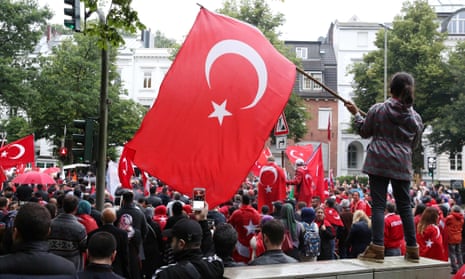German authorities believe there is a growing likelihood that thousands of Turks could apply for political asylum in the coming weeks or months, potentially creating a new influx of refugees this summer.
Following a crackdown in Turkey in the wake of last week’s failed coup attempt, rights charities such as Germany’s Pro Asyl predict there will be a significant increase in the number of intellectuals and scientists leaving posts at Turkish universities and moving to Germany.
“If the situation gets worse and the witch-hunt against any form of opposition continues, there will be a refugee movement heading for Europe,” said Pro Asyl’s director Bernd Mesovic. “We can only speculate when that will happen. As long as people are still hoping for change, they will stay in their country.”
Bilgin Ayata, a political scientist, told the German news agency DPA that the exodus could echo one in 1980. “We are looking at the imprisonment of 6,000 people, mass suspensions and a debate about the reintroduction of the death penalty. If things continue in that vein, many Turkish citizens will leave the country, as they did after the military coup in 1980,” Ayata said.
On Friday, Turkey’s prime minister, Binali Yıldırım, said on Friday that a second coup attempt was possible because not all those responsible for the last coup had been apprehended, raising fears that the crackdown would continue.
Yıldırım criticised the US for demanding evidence before it agrees to extradite Fethullah Gülen, an Islamic scholar who Ankara claims is responsible for the coup attempt. “Stop standing up for savages who run over citizens with tanks, who strafe people from land and the air,” he said.
Germany urged Turkey to respect the rule of law. The government spokesman Steffen Seibert said several people who had been detained in the wake of the coup attempt and had subsequently appeared on camera seemed to have been mistreated.
He said it “raises troubling questions if accused people are seen on television or photos bearing clear traces of physical violence. If individual people are humiliated or denigrated in front of the camera.”
Seibert said Germany hoped the state of emergency would be as short as possible and that it would have no impact on a deal between the European Union and Ankara to halt the flow of migrants crossing to Europe.
Insecurity among the academic community in Turkey is particularly high as Gülen helped boost participation in Turkish higher education in the 1970s and 80s, meaning many now find themselves accused of harbouring sympathies for his Hizmet movement.
“A campaign against intellectuals has been growing since 2013, but people used to believe it would blow over,” said a spokesperson for Germany’s Foundation for Dialogue and Education, an institute with close ties to the Hizmet movement. “Now many of them are fearing for their lives.”
An unlikely political alliance of the German Green party and Bavaria’s conservative Christian Social Union has proposed that Germany should offer asylum to political refugees from Turkey. The CSU’s Andreas Scheuer said: “We expect that people will come here who are persecuted by the reign of [President Recep Tayyip] Erdoğan and his party.”
Germany’s interior minister, Thomas de Maiziere, has expressed concern that the civil unrest in Turkey is in danger of spilling over into Germany, noting that the 3 million Turks living in Germany were just as split as Turkey itself and tensions within Turkish communities were high.
In Austria, meanwhile, the foreign minister, Sebastian Kurz, took the unusual step of appealing to Erdoğan supporters there to move back to Turkey. “Those who want to get involved in Turkish interior politics are free to leave our country”, Kurz told Der Standard newspaper.









